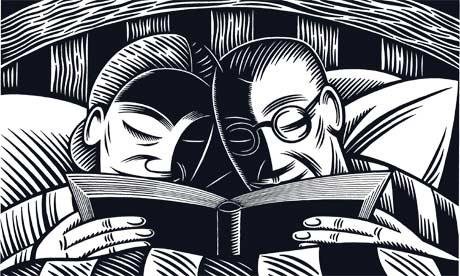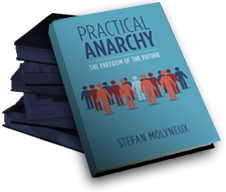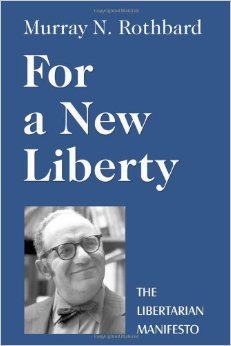A Reading List for Liberty Lovers, Freethinkers, and Anarchist Initiates (Part 1)

Reading books is one of my most enjoyable pastimes. Reading supplements my passion for anarchism nicely, and I believe it would behoove all liberty lovers to read voraciously and widely.
It is through reading that we broaden our knowledge and learn to communicate effectively. Without reading, we cannot gain the ammunition we need to spread philosophy, grow as sovereign individuals, and learn skills for living without the State.
Recently, I have had a lot of people in the liberty community ask me about my book recommendations. They either want to learn more about anarchy or more about psychology. But usually, they want my opinion on the best anarchist material for gaining awareness and knowledge.
Therefore, I have decided to share 6 anarchist or libertarian books that I believe will help any anarchist further develop their philosophy and character. But more importantly, these books will also help groom initiate anarchists and freethinkers into understanding all the ideas, and instill non-anarchists with the first glimmer of thought concerning freedom.
Nothing could be more important.
All of these books have influenced me profoundly. I will provide commentary on each one. The books are shown in no particular order, and this list will contain two parts with 3 books each.

1) Practical Anarchy—by Stefan Molynuex
Let me get this out of the way first: I do not consider the author of "practical anarchy" an anarchist anymore, regardless of what he labels himself.
Stephan Molyneux is more closely aligned with neoconservatism or fascism. His recent podcasts and content consist of celebrating or "analyzing" Trump, spouting anti-immigration rhetoric, and apologizing for police and their brutality.
With that said, I still believe his older content and writing contain value. Molyneux's website www.freedomainradio.com still harbors good content if you scour his voluminous archives. However, I would not be surprised if he eventually purges some of his older material.
When I was metamorphosing into an anarchist, I read a lot of this older content, but I was particularly struck by his book "Practical Anarchy."
It was one of the most succinct pieces of writing I have read. It explains the basics of how anarchy "will work" without using a bunch of philosophical fluff, jargon, or long winded explanations.
Molyneux keeps the work straightforward and provides explanations for "how to roads will work" without a State; how a sovereign territory would defend itself against State aggressors; how property disputes could be settled and so on.
He attempts to tackle all possible questions associated with the mechanics of anarchism. After reading this book, any student of anarchy will sigh with relief, because their armamentarium of anarchist ideas will be overflowing and rich.
Here is a passage from the books explaining the problem of roads:
"The most important thing to understand about anarchism is that it is a moral theory which cannot logically be judged by consequences alone. For instance, the abolition of slavery was a moral imperative, because slavery as an institution is innately evil. The abolition of slavery was not conditional upon the provision of jobs for every freed slave. In a similar manner, anarchic theory does not have to explain how every conceivable social, legal or economic transaction could occur in the absence of a coercive government. What is important to understand is that the initiation of the use of force is a moral evil. With that in mind, we can approach the problem of roads more clearly.First of all, roads are currently funded through the initiation of force. If you do not pay the taxes which support road construction, you will get a stern letter from the government, followed by a court date, followed by policemen coming to your house if you do not appear and submit to the court’s judgment. If you use force to defend yourself against the policemen who are breaking into your home, you will very likely be shot down.
The roads, in other words, are built at the point of a gun. The use of violence is the central issue, not what might potentially happen in the absence of violence.
That having been said, roads will be built by housing developers, mall builders, those constructing schools and towns – just as they were before governments took them over in the 19th century. For more on this, please see the section on “Roads” below."
In my opinion,"Practical Anarchy" represents the best primer for gaining novel insights into society under anarchy, even though the author has strangely moved away from the brilliant ideas he espoused when in his prime.Here is the E-copy pf of his book:http://cdn.media.freedomainradio.com/feed/books/PA/Practical_Anarchy_by_Stefan_Molyneux_PDF.pdf
2) For a New Liberty—by Murray Rothbard
Before I even considered the possibility that I might be an anarchist—I thought Ron Paul was the epitome of what it means to be a freethinker, and I believed libertarianism was the political philosophy par excellence. However, I did not realize it was possible to travel further down the rabbit hole. That is until I read Murray-Rothbard's "For a New Liberty," which I learned about by reading Ron Paul's books.If I were to credit a single piece of literature for thrusting me headlong in the anarchist philosophy, I would point to this book.
I read it about 7 years ago when I was on the cusp of a philosophical and politico-spiritual breakthrough. And even though it has been a long time since I have picked it up again, I still remember chapter titles and content.
Chapter 3, called "The State," was probably the most scathing critiques of what government actually is that I have ever had the pleasure of reading. It was this section that finally helped provide me with the "ah-ha moment" that made me dispense with my old authoritarian dogma.
Rothbard's book gave me my first experience of hearing someone refer to government as a criminal organization or Mafia-like agency.
Here is a characteristic example of Rothbard at his best:
The State! Always and ever the government and its rulers and operators have been considered above the general moral law. The “Pentagon Papers” are only one recent instance among innumerable instances in history of men, most of whom are perfectly honorable in their private lives, who lie in their teeth before the public. Why? For “reasons of State.” Service to the State is supposed to excuse all actions that would be considered immoral or criminal if committed by “private” citizens. The distinctive feature of libertarians is that they coolly and uncompromisingly apply the general moral law to people acting in their roles as members of the State apparatus. Libertarians make no exceptions.For centuries, the State (or more strictly, individuals acting in their roles as “members of the government”) has cloaked its criminal activity in high sounding rhetoric. For centuries the State has committed mass murder and called it “war”; then ennobled the mass slaughter that “war” involves. For centuries the State has enslaved people into its armed battalions and called it “conscription” in the “national service.” For centuries the State has robbed people For a New Liberty 56 at bayonet point and called it “taxation.” In fact, if you wish to know how libertarians regard the State and any of its acts, simply think of the State as a criminal band, and all of the libertarian attitudes will logically fall into place.
Like Molyneux's book, this work helped me generate insights on how anarchy could function, the nature of property, fundamentals of the nonaggression principle, and basics of Austrian economics.As a warning for any new readers, bear in mind that this book is a bit dated. It was written in the 70's, and most of Rothbard's examples are rooted in this time period. Nonetheless, the basic principles and underlying ideas are as relevant today as they were back then.
Here is a link to the E-book.
https://mises.org/library/new-liberty-libertarian-manifesto
"
"
3) The Most Dangerous Superstition—by Larken Rose
An anarchist reading list would be incomplete without adding Larken Rose' seminal modern work on anarchism, "The Most Dangerous Superstition."Unfortunately, I did not find Larken's book until many years after I had already become an anarchist. Of course, he did not publish it until 2011. At this point, I had already been an ardent liberty lover for several years. But when I discovered it and finally gave it a read, I realized the importance of this work.
Larken's premise is that the concept of "government" is a dangerous superstition. It is a superstition because it does not exist. It is a myth. People only imagine that it is real. And prior to reading this perspective, I never really considered the psychology behind how people view those in power and WHY they believe people have power.
Like Molyneux's book, this work is extremely concise and easy to follow. It is meant for the everyman. Larken does not bog the reader down with mixed metaphors, jargon, or incomprehensible language. Instead, he goes straight for the jugular. Matter of fact, he outright says that he may offend or shock or scare people in his introduction, which is titled "Preparing the Reader."
In the book, Larken tackles many aspects in regards to anarchist thinking. One thing I like is that he debunks nonsensical euphemisms like "crime," "law enforcement,"countries,' etc, and explains why these terms are misnomers and represent imaginary categories within society.
This is a sample of how Larken does not mince words or protect the readers feelings:
"All mainstream political discussion – all debate about what should be “legal” and “illegal,” who should be put into power, what “national policy” should be, how “government” should handle various issues – all of it is utterly irrational and a complete waste of time, as it is all based upon the false premise that one person can have the right to rule another, that “authority” can even exist. The entire debate about how “authority” should be used, and what “government” should do, is exactly as useful as debating how Santa Claus should handle Christmas. But it is infinitely more dangerous. On the bright side, removing that danger – the biggest threat that humanity has ever faced, in fact – does not require changing the fundamental nature of man, or converting all hatred to love, or performing any other drastic alteration to the state of the universe. Instead, it requires only that people recognize and then let go of one particular superstition, one irrational lie that almost everyone has been taught to believe. In one sense, most of the world’s problems could be solved overnight if everyone did something akin to giving up the belief in Santa Claus."In real life, I had the luxury of meeting and conversing Larken at Porcfest 2015 in New Hampshire. Larken is a outspoken critic of government, and happens to be one of the most well known faces of liberty. He is also an awesome human being. If there is one book that I recommend on this list to read for newly minted anarchists or freedom acolytes, it would be this book. It is amazing.
Next Round of Books; Reading is a Psychedelic Experience
In the next part of this series, I will cover three more books that have influenced my anarchist ideals. I will also showcase numerous books that I have not read in full, but that I have had the opportunity to read in part. There are a few of these that I would likely make the list, but it would be unfair of me to fully recommend them because I have not read the whole volume.As a final thought, I really hope this list helps people who are NOT already anarchists, but who have a feeling that something is not right in the world; those people who have a tendency to question everything. I hope it provides that little extra kick to bring them over to total freedom. Reading is a life altering experience, and with enough patience and contemplation, it can catalyze a total personality shift and shift a worldview—much like a psychedelic experience. Do not underestimate the power of reading.
Without our access to knowledge through books, we would all be lost.
"Sometimes, you read a book and it fills you with this weird evangelical zeal, and you become convinced that the shattered world will never be put back together unless and until all living humans read the book.” ― John Green, The Fault in Our Stars
My name is Sterlin. Follow me @sterlinluxan, Psychologic-Anarchist. I also run the Psychologic-Anarchist Facebook page and produce many YouTube videos. My interests lie in the intersection of counseling psychology and anarchism. I write about the depredations of psychiatry, and also the new philosophy of compassionate anarchism. We have a large community devoted to discussing psychology and relational voluntaryism.





As far as Molyneux goes, he not only spews absolute ridiculous rhetoric, he can't face the criticism and blocks / deletes comments from people like me because he has no response. He is as trustworthy as Alex Jones in my opinion = total shills.
So good to see I'm not alone in thinking this.
verification of realness. I can attest to fuzziness. :)
i too!
Liberty is for fools. Hillary Clinton and Slavery Save us!
Totally agree. He blocked me based on one comment I made a few months ago. Nonetheless, his older material is still good even though he changed his philosophical outlook to Statism.
Lolz so you and I are in the same club... I questioned him on GMO's and got no response but #blocked, peace dude. Followed.
he's definitely gone off the deep end in recent times. used to love him but stopped watching and reading his material.
not been blocked by stefan yet but i agree with everything you said, no idea what happened to him at all... still love his story of your enslavement video though, that really opened my eyes when i was still a statist
Everyday Anarchy is a better book to read than to hear. His audio is weird. He sounds like a cult leader. Also very disappointed that he's turned into a statist. That rarely happens. I wonder if the chemo he had altered his brain cells. Poor guy. I still love and respect his hard work and dedication to his audience.
I would also recommend "Economics In One Lesson." It's not an anarchist book, but the reader will understand why every time the government interferes with the economy the result is always bad, and often a disaster.
Thanks Sterlin. I am grateful for Steve Thomas's recent release of the audiobook version of Larkens's great work, The Most Dangerous Superstition. Here is the link so that it can be heard, if not read, by others:
http://misesaudiobooks.blogspot.com/2016/09/the-most-dangerous-superstition.html
Please rate the podcast in iTunes! https://itunes.apple.com/us/podcast/most-dangerous-superstition/id1055730978?i=1000375212041&mt=2
Upon your recommendations, I will look into the other two books, as I have not yet gave them a read .
You state that "Stephan Molyneux is more closely aligned with neoconservatism or fascism". I wonder if Stephan is a modern day Etienne de La Boetie? In Murray Rothbard classic introduction to La Boetie's great political essay "The Politics of Obedience: The Discourse of Voluntary Servitude"; Rothbard says "Certainly it is far from unusual for a young university student, eagerly caught up in a burst of free inquiry, to be a fiery radical, only to settle into a comfortable and respectable conservatism once well entrenched in a career bound to the emoluments of the status quo. But there seems to be more here than that. For the
very abstractness of La Boétie's argument in the Discourse, the
very Renaissance like remoteness of the discussion from the
concrete problems of the France of his day, while universalizing
and radicalizing the theory, also permitted La Boétie, even in his
early days, to divorce theory from practice. It permitted him to
be sincerely radical in the abstract while continuing to be
conservative in the concrete. His almost inevitable shift of
interest from the abstract to concrete problems in his busy career
thereby caused his early radicalism to drop swiftly from sight as
if it had never existed.
But if his abstract method permitted La Boétie to abandon his
radical conclusions rapidly in the concrete realm, it had an
opposite effect on later readers. Its very timelessness made the
work ever available to be applied concretely in a radical manner
to later problems and institutions. And this was precisely the historical fate of La Boétie's Discourse." for those who are unfamiliar with La Botie's work please see the link here for text and audiobook: https://mises.org/library/politics-obedience-discourse-voluntary-servitude
Thank you for the book tips
I look at it the same way with Stefan Molyneux.
I've learned a lot from his early works but now I can't watch anymore with all his trump video's.
This book explained a lot to me about principals, culture, freedom of speech, etc.
http://achterdesamenleving.nl/wp-content/uploads/2014/10/The_End_Of_All_Evil_by_Jeremy_Locke.pdf
Yep. This is probably true about a lot of people.
I've read all of these and really enjoyed them. Maybe that's why we get along so well. :)
Absolutely. Awesome!
I've read most of them! I always recommend revolution a manifesto by Ron Paul for newbies.
Yes. It's a great read, too. I think that is the one where I first heard about Rothbard.
I've been handing out copies of @adamkokesh's book "Freedom" to local government officials here in NH. First one went to Manchester Police Chief Nick Willard:
http://thefreedomline.com
https://twitter.com/RandyClemensEsq/status/783467340092567552
I think it's a very powerful book. I dig your list @sterlinluxan... I've got a little reading to do :)
Disclaimer: I am just a bot trying to be helpful.
This post has been linked to from another place on Steem.
Learn more about linkback bot v0.4. Upvote if you want the bot to continue posting linkbacks for your posts. Flag if otherwise.
Built by @ontofractal